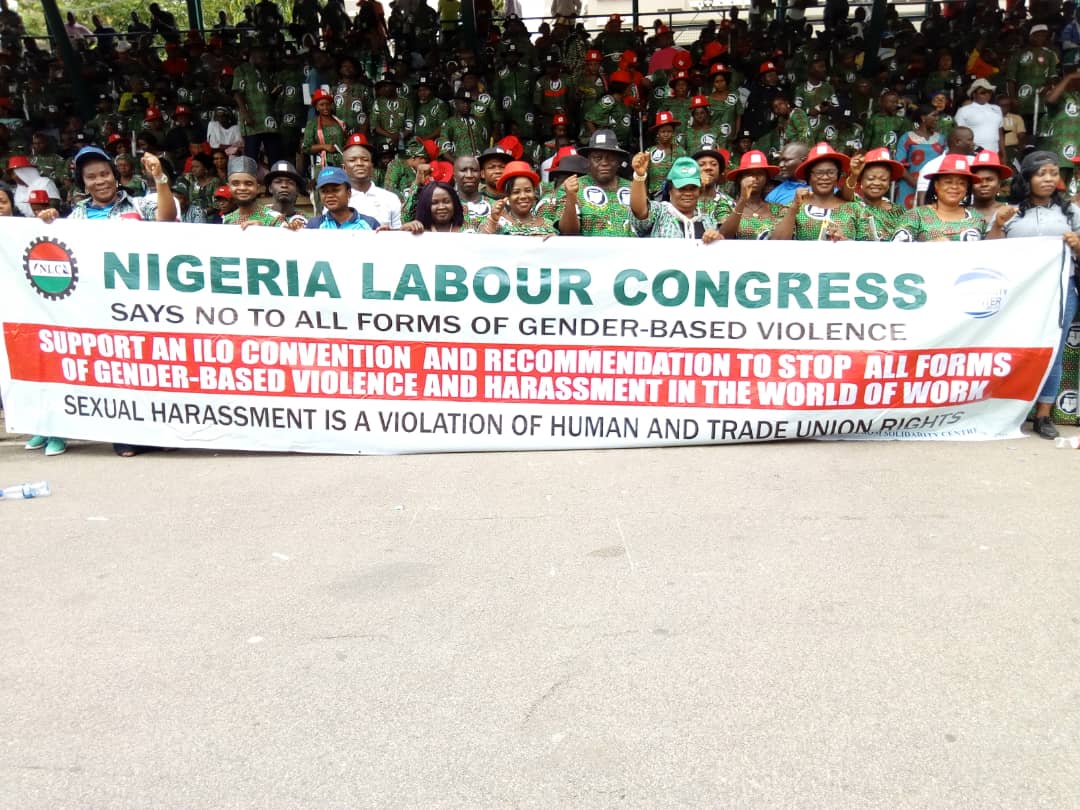
Dec 8, 2021
A new report by the Nigeria Labor Congress (NLC) and the Solidarity Center, “Breaking the Silence: Gender-Based Violence in Nigeria’s World of Work,” finds that gender-based violence and harassment (GVBH) at work is widespread in Nigeria, but goes largely unreported. The report looks at the pervasiveness of GVBH in Nigeria—which boasts Africa’s largest economy, the continent’s biggest trade union movement, and a growing population of 200 million.
A lack of worker-led research about the scope and incidence of GBVH in Nigeria’s world of work, poor implementation and enforcement of laws and workplace policies, entrenched discriminatory gender norms, and an inadequate legal framework hampered civil society and union efforts to address the problem. Moreover, the COVID-19 pandemic has exacerbated these dynamics, exposing many workers, particularly women and other marginalized workers, to an even higher risk of GBVH.
The NLC and the Solidarity Center partnered to address the lack of data on GBVH in the world of work. The NLC established a women and youth structure known as the National Women Commission in September 2003, which works with NLC affiliates and stakeholders to promote gender equality and empower women and youth to take on leadership positions. It facilitates programs that address GBVH at work.
Through this structure, women workers successfully campaigned for the NLC sexual harassment policy. This victory paved the way for women to play a leading role in the adoption of the International Labor Organization (ILO) Convention 190 (C190)—the first global, binding treaty that recognizes the fundamental right to a workplace free from violence and harassment, including GBVH.
Assault In Lagos Market
A recent incident of alleged GBVH shows the importance of this work. Earlier this month, a magistrate court recommended prosecution for a man accused of sexually assaulting a minor in an open market in Lagos. The International Lawyers Assisting Workers (ILAW) network, a project of the Solidarity Center and now the largest global network of workers’ rights lawyers and advocates, is assisting with the case.
The court’s recommendation is a direct result of awareness training with market vendors about their right to GBVH-free workplaces. Following the ILO’s adoption of C190 in 2019, the NLC and the Solidarity Center began training workers to put into practice provisions preventing GBVH. A newly formed GBVH task force in the market brought attention to the alleged assault, leading to a trial in Nigeria’s high court.
Breaking The Silence
The report results from efforts by women workers to provide concrete evidence regarding the scope and incidence of GBVH at work and break the silence to tell their stories of strength and courage.
Women workers identified two locations for study in Abuja and Lagos. Then, they drafted questions and conducted one-on-one interviews with peers. In the first stage—from September 7, 2020, to October 29, 2020—researchers interviewed 425 women. During the second stage—from December 7, 2020, to February 26, 2021—researchers 494 women. In total, women workers interviewed 919 of their peers and captured data across eight sectors, including the informal economy, manufacturing, healthcare, education, construction, media, hospitality and the public sector.
Behind these numbers are women workers like Amina,* an office cleaner who says she was sexually assaulted by a supervisor and was laid off by her employer. Saraya, a market porter, says she experienced groping and inappropriate touching while commuting to and from work and sexual harassment on the job.
Magdalene, a quality inspector at a bottling company, says she was sexually harassed and sexually assaulted by her supervisors. “I find that the joy that comes with going to work every day is no more there,” she said.
Ada has co-owned a bar with her husband. His domestic violence in their marriage extends to her workplace. “I have never reported to anyone. You are the first person I am sharing this with,” she told an interviewer.
An anonymous male youth trader spoke of the need for more training on GBVH. “We need training on GBVH for men in our market,” he said. “I believe that trainings will go a long way in sensitizing men on the negative impact of GBVH on the lives of women and children.”
Regina Otorkpa, who interviewed women workers, says, “GBVH is a monster silently destroying the confidence and future of survivors still struggling to speak out due to fear of society, fear of self and discrimination.
“Having interacted with survivors of the different forms of GBVH in Nigeria’s world of work, it has become important for the Nigerian government to step up and take a bold step towards C190 ratification. I urge women to be brave and courageous to unmask their fears; it is important that we stop the stigmatization; the struggle against GBVH is a collective one for the good of all.”
Findings and Recommendations
The report unveils high rates of GBVH at work, which goes largely unreported. Findings include:
- More than half (57.5 percent) of women workers interviewed said they experienced GBVH in the world of work.
- Nearly 44 percent said their supervisor or superior had said or done something that made them uneasy due to their gender.
- Only 19.6 percent said they reported incidents of GBVH at work.
- More than one-third (35.9 percent) said they rarely received justice even when they reported violations.
- Some 44 percent said they had suffered gender discrimination that affected their career advancement.
- Nearly one-third (28.8 percent) said they were pressured for sexual favors at work and touched in ways that made them uncomfortable.
Based on this research, the NLC’s recommendations for unions, employers and the Nigerian government include:
- Increased education and awareness of GBVH among workers, managers and supervisors, the general public and policymakers, including its root causes and impacts and the responsibility of all workers to end it.
- Ratification and implementation of ILO Convention 190 concerning the elimination of violence and harassment in the world of work, including GBVH.
- Development of workplace policies to address GBVH and gender discrimination, including safe, confidential processes for reporting incidents; transparent processes for investigation of allegations; remedies for workers who experience GBVH; penalties for perpetrators; and changes to how work is organized to address power imbalances and other risk factors for GBVH in the world of work.
- Adoption of national legislation incorporating the definition of GBVH from ILO C190, protecting the entire world of work and covering all workers regardless of contractual status, including workers in the informal economy.
*All names are pseudonyms to protect the identities of women workers.
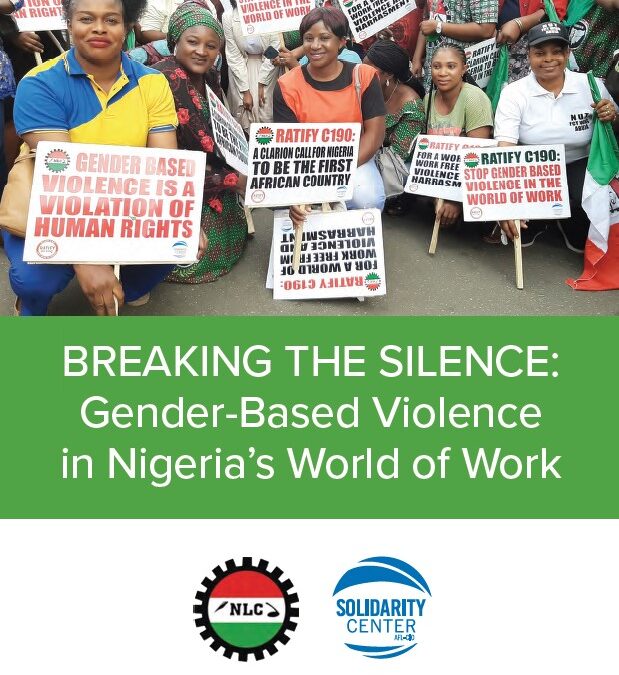
Nov 3, 2021
An alarming 57.5 percent of women workers interviewed across all sectors for this Nigeria Labor Congress (NLC) report say they experienced gender-based violence and harassment (GBVH) in the world of work. More than one-third of respondents said that even when violations were reported, justice was rarely upheld.
Download here.
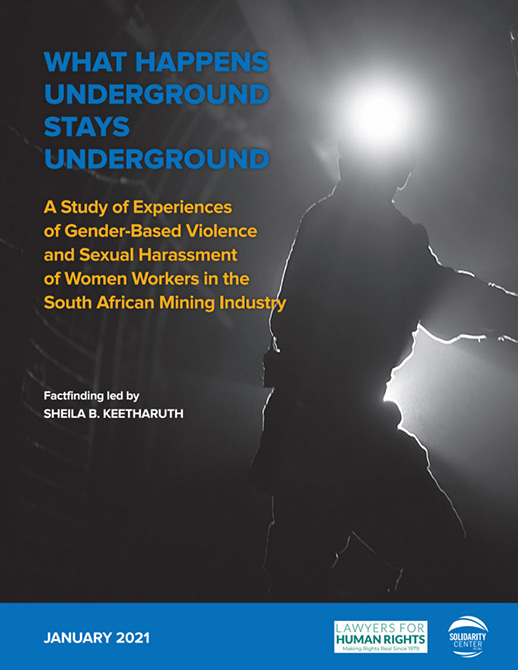
Apr 28, 2021
Women working in South African mines “at times confront danger, violence and indignity in their work environments,” where gender-based violence and harassment (GBVH) appears both widespread and normalized, according to a new report from the Solidarity Center and South Africa-based Lawyers for Human Rights (LHR).
The report, “What Happens Underground Stays Underground: A Study of Experiences of Gender-Based Violence and Sexual Harassment of Women Workers in the South African Mining Industry,” found that while verbal harassment is most common, women mineworkers also face requests for sexual favors in exchange for physical labor or for promotions, transfers or changes in work schedules. And sexual assault and harassment can occur both above and below ground at mines.
GBVH in the mining sector can be attributed to a range of complex political, social and economic factors, including:
- The dark and isolated nature of underground mines makes GBVH more likely, and monitoring and supervision of workers and evidence collection more difficult.
- South Africa’s dominant patriarchal social norms are exacerbating reporting barriers by enabling a culture of silence and victimization and the economic dependency of women on men.
- Women working within the numerically and culturally male-dominated sector are outnumbered and often subordinated in their personal security and professional development.
- Some business strategies are undermining the well-being of women workers in the mining industry, such as the outsourcing of female worker recruitment, which can expose recruits to sexual exploitation by gatekeepers of lucrative jobs, and the failure to accommodate women in the design and placement of facilities such as bathrooms, locker rooms, bus stops and elevators, which leaves women vulnerable to violence and harassment.
The report’s findings and recommendations are based on interviews conducted in Cape Town, Johannesburg, KwaZulu-Natal, Mpumalanga, Rustenburg and Wonderkop last year with former and current women mineworkers and representatives of women’s structures within mining unions, including the National Union of Mineworkers (NUM), the Center for Applied Legal Studies at Wits (CALS), the South African Gender Equality Commission, the South African Human Rights Commission and the Wits Mining Institute. All women mineworker interviewees chose to remain anonymous, to protect their safety and jobs.
“Women mineworkers, striving to support their families, live a troubling reality—one that comes at great cost to their physical and mental well-being. The stakes are high, and the failure to prevent GBVH amounts to granting tacit permission to perpetrators,” according to the report.
Lead report researcher Sheila B. Keetharuth—who previously served on the United Nations team of international experts on the Kasai, Democratic Republic of Congo—says that the lower proportion of female workers in the mining sector in South Africa is, “a recipe for disaster that necessitates easily accessible and trustworthy reporting mechanisms as provided for in the UN Guiding Principles on Business and Human Rights.”
The International Labor Organization two years ago adopted Convention 190, the first global binding treaty to address GBVH in the world of work. The treaty calls on governments, employers and unions to work together to confront the root causes of GBVH, including the multiple and intersecting forms of discrimination, gender stereotypes and unequal gender-based power relationships. South Africa has yet to ratify Convention 190.
“Safe and healthy jobs are among workers’ most fundamental rights,” says Solidarity Center Executive Director Shawna Bader-Blau. “As we observe World Day for Safety and Health at Work today, we must continue to reinforce that a safe workplace is one that is free of gender-based violence and harassment. And through unions, workers can achieve the strong, collective voice needed to improve safety and health on the job.”
Report recommendations include that:
- South Africa immediately ratify ILO C190 on Violence and Harassment at Work
- Occupational health and safety laws and policies, as well as sector-specific laws and policies, obligate employers to prevent and eliminate GBVH
- The country’s Mining Charter extend employer obligations with respect to prevention and elimination of GBVH and require that special measures be adopted for women working in mining
- In consultation with workers and unions, compulsory GBVH risk assessments be established for identifying safety risks.
- Acquisition of a mining license be conditioned on right holders’ commitment to the prevention and elimination of GBVH
- Employers adopt confidential and independent reporting system
- Women working underground be provided with a confidential, anonymous, efficient and easily accessible incident reporting system.
- Workers be informed that victims of sexual assault have the right to press separate criminal or civil charges against their perpetrators.
- Mandatory and effective education and training with respect to laws and policies on GBVH be provided to workers and supervisors, and that policies addressing GBVH be printed in all official languages, displayed conspicuously throughout the mining shafts, and widely and regularly promoted through interactive workshops.
- Policies against GBVH be included in employment contracts and clearly state repercussions for GBVH violations.
- The mining industry provide education and counseling to rehabilitate perpetrators in cases not likely to reach the level of criminal prosecution.
“Although the report shows that GBVH is rooted in complex and deeply entrenched patriarchal social norms, it also presents fairly simple, cost-effective changes to the work environment—such as improved lighting, a buddy system and safer toilet and locker room locations—that will make women mine workers less vulnerable to crimes of opportunity,” says Solidarity Center Rule of Law Department Senior Program Officer Ziona Tanzer.
Beginning in 2014, the Solidarity Center was a core member of a global coalition of worker rights organizations led by women union activists that successfully advocated for Convention 190. We support our partners as they campaign for their governments to ratify ILO Convention 190 and recognize GBVH as a primary barrier to achieving gender equality and a key step for security of all workers’ rights and seek to enhance the voice of women and other marginalized workers in policy making at the local, national, and international levels to reduce the risk of gender-based violence at work—including through their unions.
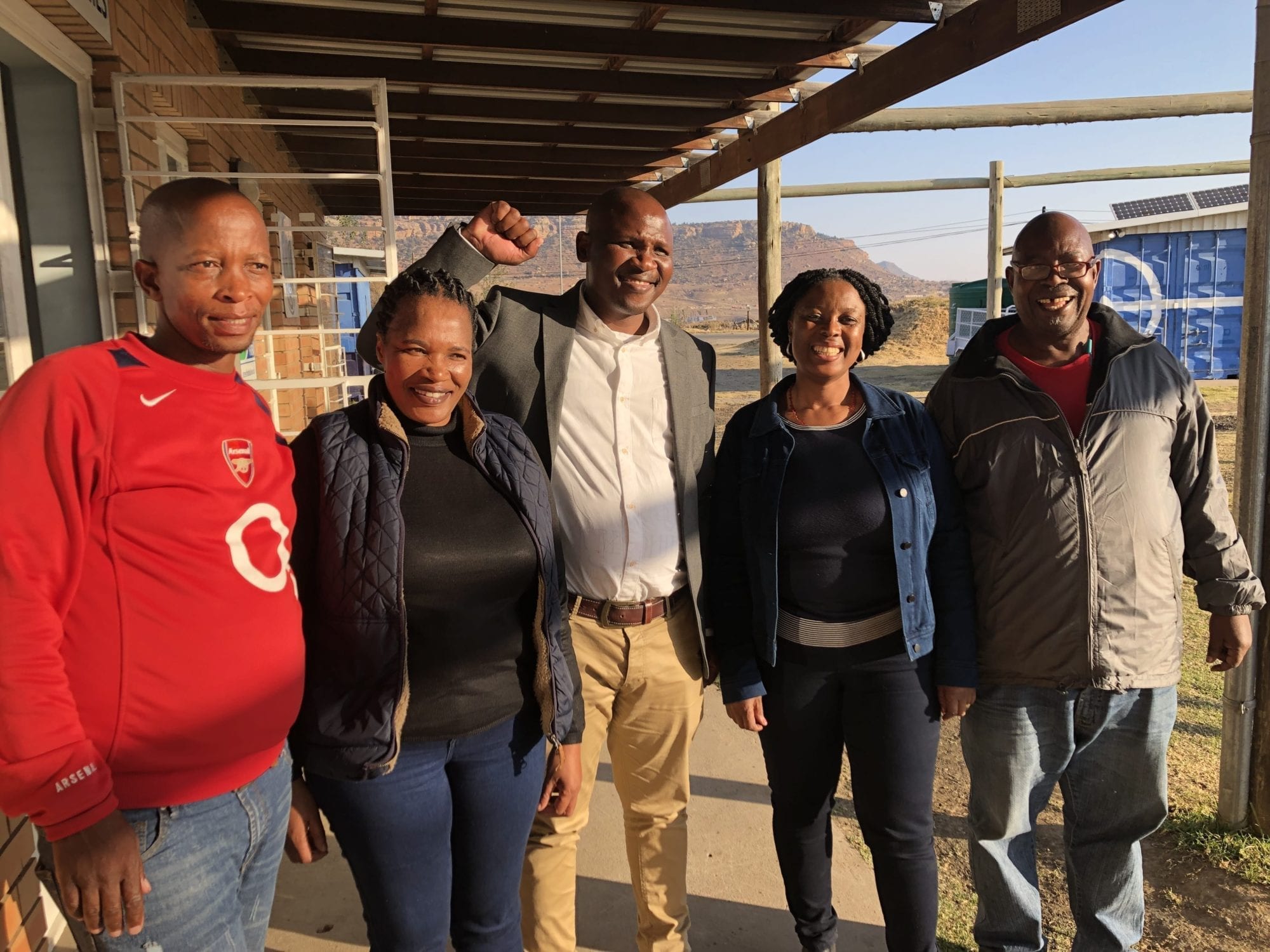
Feb 8, 2021
A worker-centered, precedent-setting program that targets gender-based violence and harassment (GBVH) in four Lesotho garment factories is now in effect for as many as 10,000 workers producing jeans for the global market.
The program inauguration on Friday was marked by a social media campaign, including SMS text blasts to garment workers, Lesotho-based media coverage and a video announcement by signatories to binding 2019 agreements—the factory owner, brands, local unions and women’s rights groups, and international organizations and unions, including the Solidarity Center, Workers United, and the Worker Rights Consortium. The program, which is unique in that it is binding and worker-led, will empower Lesotho unions, human and women’s rights groups to effectively address GBVH. One of its tools is a new Solidarity Center GBVH training video in English and Sesotho, which debuted on Friday, that will be widely disseminated to garment workers during training programs and via social media.
To combat widespread abuse, the program is providing garment workers with GBVH awareness trainings, a confidential reporting system and enforcement processes administered by an entity independent of employer influence. Under the program:
- Workers’ Rights Watch, an independent Lesotho-based nonprofit entity established by the agreements, is fully empowered to investigate complaints of GBVH and determine remedies to redress violations of the agreements’ GBVH code of conduct.
- A confidential, toll-free information line run by one of the women’s rights organizations is available six days a week for garment workers to discuss GBVH issues and remedies with trained counselors, including determining their rights under the code of conduct and how to participate safely in a complaint and remedy process.
- Education and awareness campaigns and programs are being provided to garment workers and their supervisors that get at the root causes of gender discrimination and violence against women, outline the GBVH code of conduct and remedies under the program, and encourage reporting through the information line.
“Painful occurrences have been happening at our place of work,” said Nien Hsing shopfloor union representative ‘Mamoleboheng Mopooane, describing demands by supervisors for sexual favors from workers seeking employment at the factory gate in exchange for work in previous years.
“We are really grateful for this program because before it has even [officially] started, we can see that there are already existing successes,” she said, adding that the program will be of even greater assistance once workers know where to report violence and harassment, and can see that GBVH incidents are taken seriously.
Program partners include Lesotho-based unions and women’s rights groups that will play a key role in implementing the program to ensure that the binding agreements change the culture and practice at Nien Hsing’s factories and provide remedy for victims of GBVH. These include the Federation of Women Lawyers in Lesotho (FIDA), the Independent Democratic Union of Lesotho (IDUL), the National Clothing Textile and Allied Workers Union, Lesotho (NACTWU), the United Textile Employees (UNITE) and Women and Law in Southern Africa Research and Education Trust (WLSA)-Lesotho; international rights organizations Solidarity Center, Worker Rights Consortium (WRC) and Workers United. Global brands Levi Strauss, The Children’s Place and Kontoor Brands and the employer Nien Hsing are signatories to and participants in the binding agreements and GBVH program. Funding comes from Levi Strauss, The Children’s Place and Kontoor Brands together with the Solidarity Center and WRC in collaboration with the U.S. Agency for International Development (USAID).
A 2019 survey of workers at three Nien Hsing factories in Lesotho by WRC, which spurred the agreements, found that nearly two-thirds of the women from three factories who were interviewed reported “having experienced sexual harassment or abuse” or having knowledge of harassment or abuse suffered by co-workers. Women workers from all three factories surveyed identified GBVH as a central concern for themselves and other female employees.
The agreements build on the Bangladesh Accord on Fire and Building Safety, in which unions were key participants. The Accord recognizes the fundamental role of collective bargaining in achieving an agreement that is binding and enforced, backed by international brands’ commitment to link their ongoing business with their supplier to their compliance.
The Lesotho GBVH program also is partially modeled after the Fair Food Program, a set of binding agreements between leading food brands, like McDonald’s and Whole Foods, and the Coalition of Immokalee Workers, which uses an independent complaint mechanism.
While sexual harassment and other forms of gender-based violence may happen at any workplace, GBVH is rampant in the global garment and textile industry.
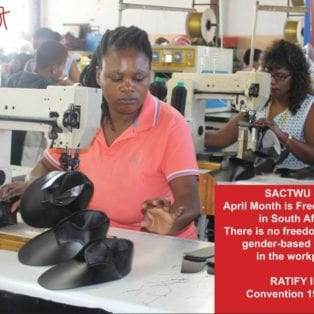
Apr 21, 2020
In Tunisia, 150 women garment workers self-quarantined in their factory to manufacture desperately needed protective masks, churning out 50,000 a day as the COVID-19 crisis broke out. The South African Clothing and Textile Workers’ Union (SACTWU) reached an agreement with employers to guarantee six weeks full pay for 80,000 workers, nearly all women, as operations shut down. And, undeterred by the limitations of social isolation policies, Honduran women union activists are using social media to demand their government ratify a global treaty (Convention 190) ending gender-based violence and harassment (GBVH).
Around the world, women and their unions are leading the way, recognizing that gendered economic challenges are worsened by the pandemic, which is hitting women and other marginalized groups especially hard. They are spearheading calls for safety and health protection and raising awareness about C190, which provides remedies and tools for governments and employers to address the increase in GBVH at work and home.
C190, which the International Labor Organization approved last year, requires employers and governments to take steps to address and prevent GBVH at home, both when it is a place of work and when domestic violence impacts workers’ workplace performance.
Challenging the View that Domestic Violence is a ‘Private Matter’
One of the most dramatic examples of how the COVID-19 pandemic has exacerbated gender inequalities is the significant increase in domestic violence against women.
In El Salvador, domestic violence has increased by 70 percent. Anti-domestic violence service providers from Lesotho to Brazil are reporting increases in calls from women experiencing abuse seeking assistance, according to Solidarity Center staff. Isolated in their homes—or the homes of their employer if they are domestic workers without access to private spaces—many women cannot even reach out for assistance or otherwise seek help to end the abuse.
COVID-19 also has engendered a brutal twist: Exposure to the coronavirus is being used as a threat to further control partners and family members, who in some cases are being forbidden from leaving the house or even are thrown out with nowhere to go. The International Trade Union Confederation (ITUC) and global unions such as UNI and IndustriAll offer resources and guidance about measures unions can take to address the increase in domestic violence resulting from COVID-19 lockdowns.
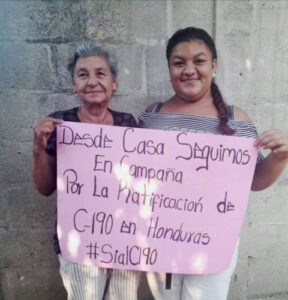
In Honduras, union activists are posting photos of themselves on social media with signs urging passage of C190. Credit: Promotoras LegalesUnions have long recognized domestic violence as a critical issue impacting a workers’ ability to obtain and maintain employment. Research shows that when workers are affected by domestic violence, it often affects their participation in work, their productivity and achievement of work tasks and targets. Employers often inadvertently blame and even terminate the target of domestic abuse in response to the disruptions caused by the abuser.
A Canadian Labor Congress (CLC) survey of more than 8,000 union members that found 67 percent had experienced domestic violence. Of those, 47 percent say they were prevented from going to work by their abuser and 8 percent lost their jobs because of ramifications from their abuse. Surveys by the ITUC in four countries found similar results. For instance, 75 percent of respondents in the Philippines reported that domestic violence affected their work performance because they were unwell, distracted or injured as a result. One in three respondents (34 percent) who had experienced domestic violence reported that their abuser was employed in the same workplace.
C190 prohibits violence and harassment, including GBVH in the “world of work,” which includes private and public places where work is performed, specifically recognizing that many workers work in their own homes or provide care or other services in others’ homes. C190 places responsibilities on ratifying governments, and in turn duties on employers, to mitigate the effects of domestic violence on workers’ ability to access and maintain employment.
In France, the General Confederation of Worker (CGT) is pushing the government to take action around the increase in domestic violence during the COVID-19 confinement by prohibiting dismissal of all targets of domestic violence and requiring employers to negotiate measures to prevent and protect targets of violence, including domestic violence.
Unions Address Effects of Domestic Violence on Workers
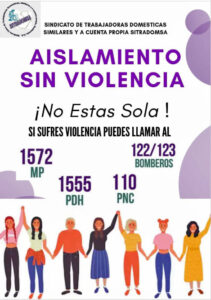 During the COVID-19 crisis, unions around the world are addressing the effects of domestic violence on workers.
During the COVID-19 crisis, unions around the world are addressing the effects of domestic violence on workers.
“Isolation without violence!” reads a graphic (at left) that the Guatemala domestic workers union, Sitradomsa, posted on its Facebook page, with contact information for those experiencing abuse.
In South Africa, where police have received more than 87,000 reports of domestic violence in the first week of mandated social isolation, the Federation of Unions of South Africa (FEDUSA) is appealing to the government to increase the number of mobile clinics, both for COVID-19 testing and for treating targets of gender-based violence with a special focus on vulnerable areas, such as densely populated townships and informal settlements. “The mobile clinics should include staff or other health workers specially trained in handling and managing gender-based violence, including providing psychological support for the victims,” the federation says in a statement.
In Georgia, after an employer forced workers to sleep at a grocery store overnight because of the country’s 9 p.m. to 6 a.m. curfew, the Georgia Trade Union Confederation (GTUC) took action to ensure the workers, mostly women, could safely return home. The union successfully urged the government to require employers to provide workers free transport from work, an element taken from C190, which encompasses a broad definition of violence at work that includes the time workers spending getting to and from work.
Women’s groups in Lesotho and unions representing garment workers, nearly all of them women, are working with employers and the government to address the effects of domestic violence on workers during the lockdown as they continue to fight for wage replacements.
The global campaign for C190 ratification also continues, as the crisis brings in stark relief the connection between violence at home and work. “From home, we are still campaigning for the ratification of C190,” read signs dozens of union members and their families in Honduras are posting on Facebook from their homes.
In Nigeria, women leaders in the Nigerian Labor Congress are highlighting how C190 addresses the increased violence and harassment experienced by nurses, the majority of whom are women, and workers who are now forced to stay home in abusive homes. In South Africa, the Congress of South African Trade Unions (COSATU) and SACTUW are championing government ratification of C190 through Facebook and other online platforms.
“Protecting workers from domestic violence is a core part of an employers’ safety and health responsibilities and the ‘duty of care’ for their employees,” according to the Domestic Violence@Work Network. “It is also an opportunity to think beyond the immediate crisis so that social partners, including governments, employers, unions and service providers, are part of transformative change.”
‘We Can Emerge from this Crisis Stronger’
In the long run, the impact of COVID-19 will disproportionately affect women’s economic and productive lives differently than men, according to a new United Nations report. “Across the globe, women earn less, save less, hold less secure jobs, are more likely to be employed in the informal sector,” according to the report. “They have less access to social protections and are the majority of single-parent households. Their capacity to absorb economic shocks is therefore less than that of men.”
Women make up the majority of those on the frontlines of the pandemic—working as retail clerks, street vendors, domestic workers and health care workers, especially nurses, midwives and community health workers. Nearly 60 percent of women around the world work in the informal economy, where they are paid less with few or no social benefits and no reserves to fall back on in times of crisis. They often depend on public space and social interactions to make a living, and now are restricted to contain the spread of the pandemic. Globally, women make up 70 percent of the health workforce where they are literally face to face with the virus.
Women also are bearing the brunt of unpaid care work and housework at home, both of which have increased exponentially as families are isolated together, with children out of school and housebound elderly and ill relatives. Before COVID-19, women were doing three times as much unpaid care and domestic work as men. In Latin America, for instance, the value of unpaid work is estimated as between 15.2 percent (Ecuador) and 25.3 percent (Costa Rica) of GDP.
“The coronavirus pandemic has highlighted the need for women workers to be a part of negotiations with employers and governments and the need for continued leadership by women to bring an inclusive approach specifically with a focus on unpaid care work, domestic violence and equal pay,” says Solidarity Center Equality and Inclusion Co-Director Robin Runge.
The UN estimated earlier this year that based on current trends, it would take 257 years to close the gender gap in economic opportunity. Left unaddressed, the impact of the coronavirus will “compound global injustices and inequalities, further marginalizing women, people of color, migrants, informal economy workers, and other exploited groups,” according to the Women in Migration Network (WIMN), which includes the Solidarity Center. The alternative, WIMN says in a statement, is for the world to “emerge from this crisis stronger, more just and more equal.”
“To steer toward that brighter future, world leaders need to think big—and they need to listen to women. Given their many roles as providers, care givers, home keepers, and essential workers in both the formal and informal economy, women, including LGBTQI women, have a multilayered understanding of the impact of the crisis on family, community and work realities that clarifies the breadth and scale of response that is needed.”






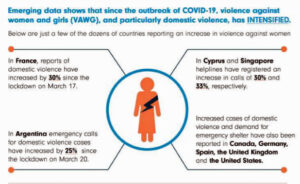

 During the COVID-19 crisis, unions around the world are addressing the effects of domestic violence on workers.
During the COVID-19 crisis, unions around the world are addressing the effects of domestic violence on workers.